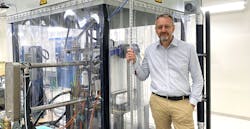The Volvo Group has opened a dedicated Fuel Cell Test Lab as part of its ambition to be fossil-free by 2040.
The lab provides “unique conditions” to test and develop hydrogen fuel cell technology solutions in heavy construction machines and other applications, according to the company.
“Fuel cell technology is a key enabler of sustainable solutions for heavier construction machines,” said Toni Hagelberg, head of sustainable power at Volvo Construction Equipment, in a prepared statement. “The lab will also serve Volvo Group globally, as it’s the first to offer this kind of advanced testing. It’s a really exciting step to accelerate the development of fuel cell solutions towards our united vision for a carbon neutral society.”
Hydrogen fuel cell technology plays a key role within Volvo CE’s overall electromobility ambitions, according to the company, together with battery electric solutions and more sustainable internal combustion engine offerings.
According to the company, battery size makes that power source impractical for larger machines and heavy construction equipment, which is where hydrogen comes in.
“Hydrogen can be produced in many different ways and it’s important to have a life-cycle approach across the entire value chain,” said Hagelberg. “Not only will the research and development carried out at the test lab be dedicated to producing fossil-free construction solutions, we will also look at how the hydrogen itself has been produced, and strive for so called ‘green’ hydrogen produced from renewable energy.”
How does a hydrogen fuel cell work?
Hydrogen fuel cells work by combining hydrogen with oxygen, with the resulting chemical reaction producing electricity. The process is completely emission-free, with the only by-product being water vapor. In principle, a fuel cell works much like a battery, except that it generates its own electricity from the hydrogen on-board rather than being charged from an external source. This means it can deliver longer driving ranges, according to Volvo, and therefore is more feasible for long-haul transportation and heavier equipment.
An added benefit of hydrogen fuel cell solutions, it says, is that they will also be free from the traditional machinery noise pollution. Without a combustion engine, hydrogen powered machines will be comparable to the low noise levels of the electric compact machines.
The Fuel Cell Test Lab is a demonstration of the same dedication to hydrogen fuel cell technology, as the recent launch of cell centric, a joint venture by Volvo Group and Daimler Truck to accelerate the development, production and commercialization of fuel cell solutions within long-haul trucking and beyond. Both form a key part of the Group’s overall ambition to be 100% fossil free by 2040.
Source: Volvo CE





